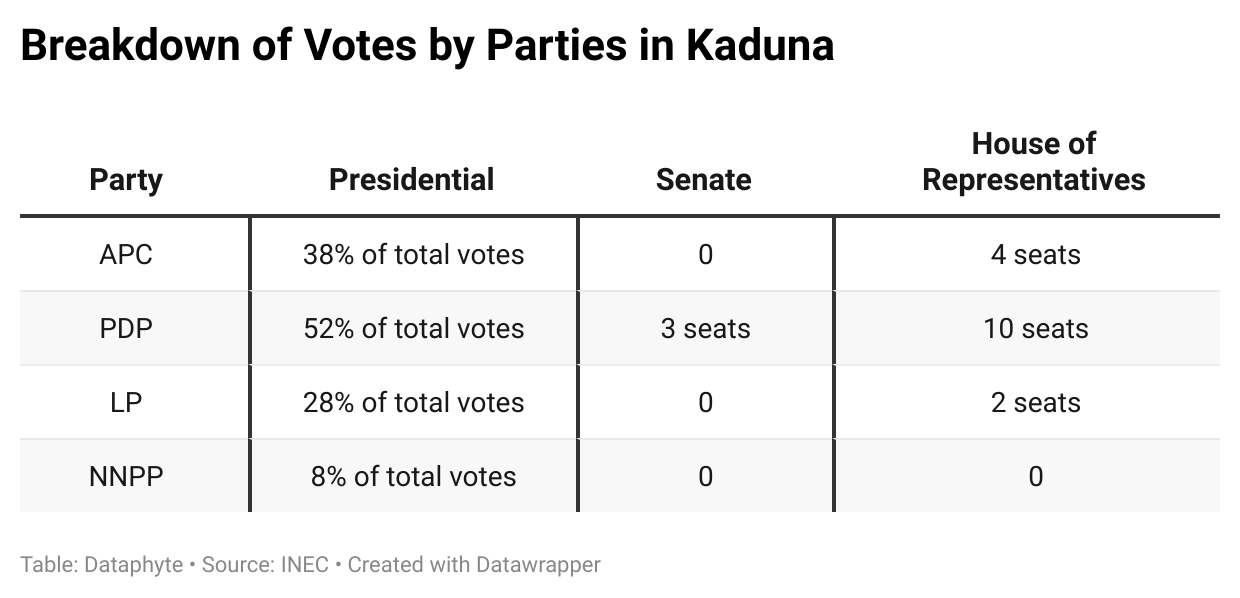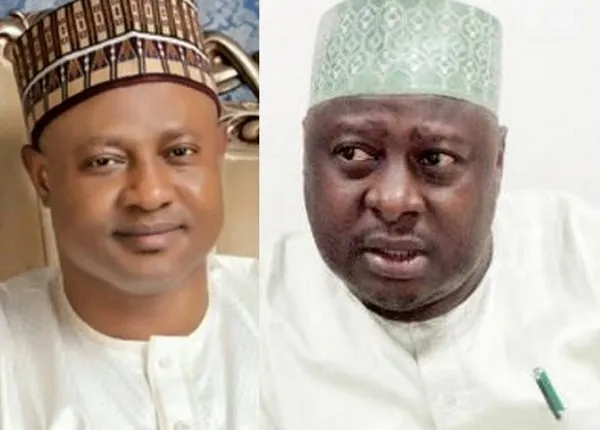Religion, ethnicity and revenge against perceived injustices are in the front burner as voters prepare to decide who governs the Kaduna State on March 18.
Seventeen candidates are running for governor from various political parties. Still, the All Progressives Congress (APC), the People’s Democratic Party (PDP_,the Labour Party (LP) and the New Nigerian Peoples Party (NNPP) are the leading political parties.
These four parties all enjoy good support within their bases, giving the elections a strong sense of competition.
The leading candidates are Senator Suleiman Hunkuyi of the NNPP, Senator Ashiru Isa of the PDP, Senator Jonathan Asake of the LP, and Senator Uba Sani of the APC.
PDP’s presidential victory
The PDP got a surge of votes in the February 25 presidential elections.
The PDP received 554,360 votes overall in the election, followed by the APC with about 399,293 votes. The LP and the NNPP got 294,000 and 92,969 ballots, respectively, to finish third and fourth.
In the elections of February 25, the APC only had three members in the House of Representatives and none in the Senate. The PDP won all the three senatorial seats and 10 House of Reps positions.

Kaduna has had 20 governors since becoming a state in 1967. Nine were democratically chosen, while the other eleven were military officers. Before El-Rufai of the APC came to power in 2015, all the previous governors since 1999 had been of the PDP stock.
The governor’s choice
Senator Uba Sani, the APC candidate and El-Rufai’s choice, presently serves as a Kaduna Central Senatorial District senator. Sani is anticipating to take over the reins and carry on the job of El-Rufai from May 29 this year.
In the Nigerian political system, governors pick their successors who will follow in their footsteps and protect them when out of power. Opposition governors often expose the previous governments of different political parties and sometimes lie about, belittle or deride their achievements, according to analysts.
The Sun recently published a report arguing that Uba Sani was the best candidate for the position because he was involved in both the design and implementation of El-Rufai’s policies while serving as the governor’s political adviser from 2015 to 2019. The article claimed that other candidates would struggle to comprehend, let alone follow, El-Rufai’s policies in contrast to Uba Sani. Many, however, claim that El-Rufai’s blueprint is not the best for the state, claiming it is divisive.
Isah Ashiru, a former representative who ran for office in 2019 but lost to Governor El-Rufai, is the standard bearer of the PDP. Observers consider Ashiru as a candidate with the best opportunity to unseat the APC-led government. In addition to that, the leadership of the Accord Party, ADP, ZLP, and six other political parties, including AA, APM, APP, APGA, and NRM, have endorsed Ashiru. Many, however, argue that the national election will be different from local election, noting that the situation may be different this time.
The leader of the Southern Kaduna Peoples Union (SOKAPU) and a former lawmaker, Jonathan Asake, carries the LP banner. Asake, whose position as president of SOKAPU has made him a preferred candidate in Southern Kaduna, withdrew from that position in order to run for governor. He enjoys the support of the Christian community and minority groups who feel neglected in the last eight years. Asake, however, has taken over PDP base, and many are not convinced he will muster sufficient votes to win. Other argue that like in the presidential election, his emergence might favour the APC.
Senator Suleiman Hunkuyi of the NNPP was a candidate for the APC before switching parties to the PDP in 2019. He was elected to the Federal Republic of Nigeria Senate in 2015 and represented the Kaduna North Senatorial District. He abandoned the PDP in 2022 and joined the NNPP. He has had a running battle with El-Rufai and has criticised him on many occasions. Many see his chances as slim, saying he is not on ground in Kaduna at the moment.
According to observers, the contest would be a stiff competition between Uba Sani of the APC and Isah Ashiru of the PDP.
The unwritten Muslim-Christian ticket rule
Before 2019, Kaduna State had been run under the unspoken rule that the deputy governor would be a Christian if the governor was a Muslim. Until the 2019 election. this had been the case. But the 2019 election threw up Nasir El-Rufai and his deputy, Hadiza Sabuwa Balarabe, both Muslims. This, to many, broke this unspoken rule. In 2023, the APC gubernatorial candidate and his deputy are also both Muslims.
Late Bala Bantex, a Christian, served as the deputy governor from 2015 to 2019 but later resigned to run for the Senate in 2019.
A frontline Islamic cleric, Sheikh Abubakar Gumi, argued that Kaduna was not prepared in any way for a Muslim-Muslim ticket due to its culture and environment when the Muslim-Muslim ticket was put forward in 2019. Several organisations in Kaduna debated this argument.
With the Muslim-Muslim ticket, Sani appears to have followed his predecessor’s lead. He chose Hadiza Sabuwa Balarabe, the present deputy governor of Kaduna, as his running mate.
On the other hand, Ashiru of the PDP chose John Markus Ayuba, the chairman of the PDP Stakeholders in the Zangon Kataf Local Government Area, as his Christian running companion.
Jonathan Asake of LP, a Christian, chose Bashir Idris Aliyu, a Muslim, as his running mate. Sani Mazawaje, another Muslim, was picked by Suleiman Hunkuyi of NNPP, who is also a Muslim, as his running partner.
The APC and the NNPP candidates have Muslim-Muslim running mates, while the LP and the PDP candidates have mixed tickets. This, according to analysts, willl play a role in the election.
Would these factors matter?
When asked if these variables might affect the electorate’s decision, Yinusa Tanko, the LP presidential campaign spokesman, told Dataphyte that the electorate’s decision would not be influenced by how they voted in the presidential election. He claimed that even though the Muslim-Christian ticket rule was unconstitutional, it was perceived by the populace as a rule of governance that gave people a sense of security – even though it would not guarantee the quality of leadership.
He asserted that the governor’s decision could be either positive or negative, stating that the governor’s decision did not represent the people’s preferences, He noted that occasionally the governor’s choice did not even represent the preferences of his political party.
Mr Tanko stated that the people were seeking a candidate with a credible record. “People are looking for someone who is empathetic towards their needs and who would care for them in the course of governance.”
An Abuja-based political analyst, James Ekom, said there were many people and ethnic groups seeking a pound of flesh who would speak through their votes on March 18.
“The governor has done so well and set the state on the path of growth, but many would not agree. Some think a lot of social issues would have been handled differently and more maturely,” he said.




.webp)